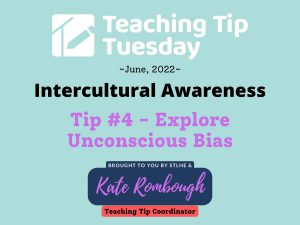
What is Unconscious Bias?
Research suggests that we are hard-wired to have opinions about people based on hidden bits of information that influence our thoughts and behaviours. This process happens beyond our awareness or intentional control and is called “unconscious bias”.
Why Should I Teach about Unconscious Bias?
This hard-wiring develops from prior experiences and is related most often to a fear response. It’s like coming to learn a stove is hot because someone told you so or you touched it and got burned, and therefore generating a belief that all stoves are hot. These beliefs create perceptual blocks that result in an inability to see alternative viewpoints, to solve problems, or in some cases, to understand the problem at all. The bottom line is, we just cannot see things any other way.
Where Can I Find More About Unconscious Bias?
- McLennon, T. (2021). Intercultural Awareness and Competence-3.1 Facts. Pressbooks.pub; Pressbooks. https://ecampusontario.pressbooks.pub/intercultural/chapter/facts/#h5pbookid=49§ion=top&chapter=h5p-interactive-book-chapter-79317301-72a3-4eb8-a6d7-b113f984b34c
- Darla Benton Kearney. (2022, February 28). Universal Design for Learning (UDL) for Inclusion, Diversity, Equity, and Accessibility (IDEA) – 4.3: Uncovering Unconscious Bias. ca; eCampus Ontario. https://opentextbooks.uregina.ca/universaldesign/chapter/uncovering-unconscious-bias/
How Can I Teach About Unconscious Bias?
Project Implicit is a set of standard tests devised to educate us about hidden biases. The tests evaluate our implicit social cognition – thoughts and feelings outside of conscious awareness and control.
These tests will provide you and your students with the opportunity to assess conscious and unconscious preferences over different topics ranging from pets to political issues, ethnic groups to sports teams, and entertainers to styles of music.
Sessions require 10-15 minutes to complete. Select a topic of interest. Try one or do them all! At the end of the session, you will get some information about the study and a summary of your results.
- This is a reflection activity. The test is devised to get you to think about your deep-rooted biases.
- Access the test here – https://implicit.harvard.edu/implicit/
….See you next week for a new tip!
Attribution Statement: This resource was adapted from
McLennon, T. (2021). Intercultural Awareness and Competence-3.1 Facts. Pressbooks.pub; Pressbooks. https://ecampusontario.pressbooks.pub/intercultural/chapter/facts/#h5pbookid=49§ion=top&chapter=h5p-interactive-book-chapter-79317301-72a3-4eb8-a6d7-b113f984b34c CC-BY-SA 4.0
Culturally Responsive Teaching: A Reflection Guide. (2019). New America. https://www.newamerica.org/education-policy/policy-papers/culturally-responsive-teaching-competencies/ CC-BY-SA 4.0
